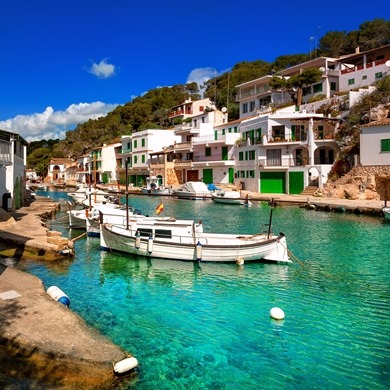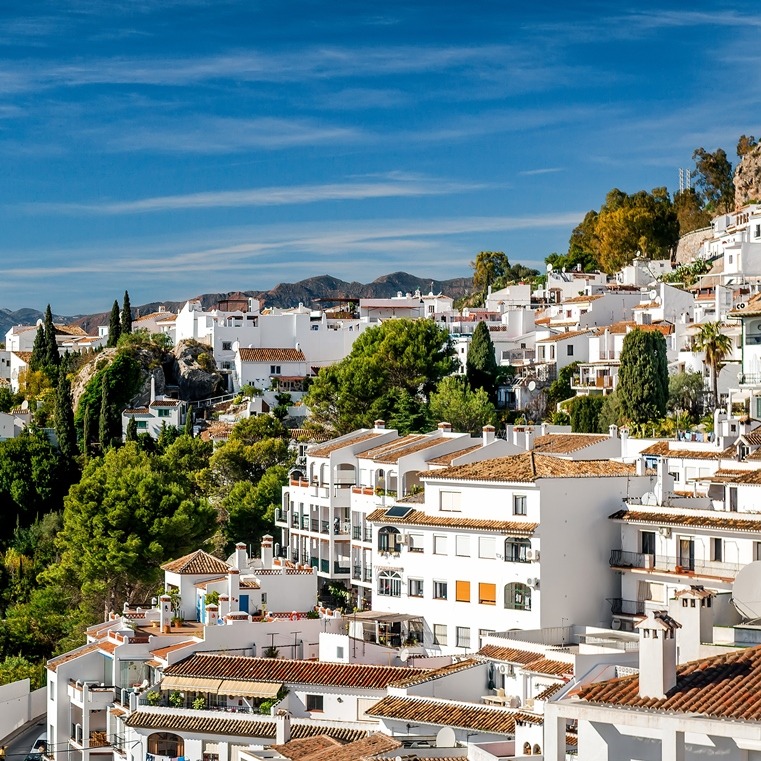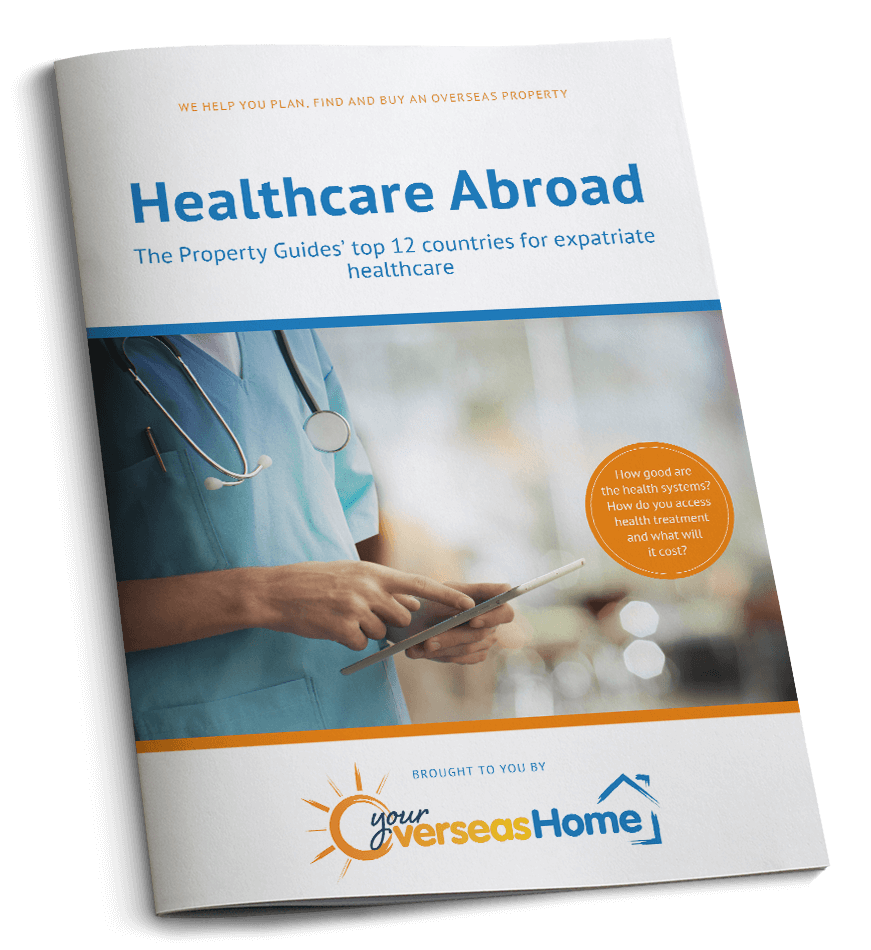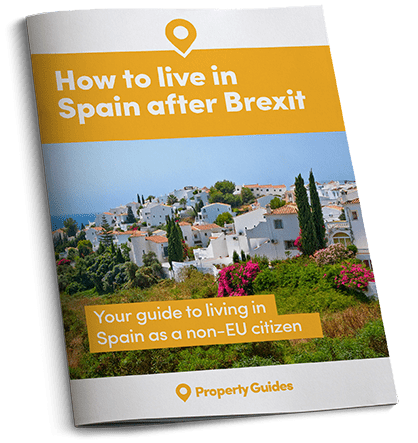Moving to Spain checklist: Visas, residency and more
How exactly do you move to Spain? And how do you legally move to Spain after Brexit, as a non-EU citizen? Whether it’s always been your dream to live in the Spanish sunshine, perhaps to retire after many wonderful holidays there, or you’re moving there for work, you no doubt have questions about the process. You may even feel a little apprehensive. The good news is that people move to Spain from the UK all the time, even after Brexit. In fact, in 2021, record numbers of Brits searched for Spanish property and interest was at its highest level since 2003.

Are you ready for your new life in Spain?
One of the most important steps of moving to Spain is understanding what visas and permits you will need to obtain. Depending on what you’re doing there, you’ll need to have the right permissions and paperwork. You’ll also need to understand the Spanish healthcare system and organise access, as well as deciding how you’ll move your possessions to Spain, get connected, and much more.
In this guide, we’ll take you through all the steps you’ll need to take before you move to Spain, to help make your Spanish dream a reality. We’ll cover:
- Moving to Spain checklist
- Organising your finances
- Finding the best places to live
- Organising healthcare
- Buying property
- Visas and claiming residency
- Moving your possessions
- Additional considerations before you move
- Do I need a visa to go to Spain?
- Requirements for moving to Spain after Brexit
- Visiting Spain without a visa: the 90-day rule
- Spain visa application options: staying longer than 90 days
- Claiming residency in Spain
- How to get a tax number (NIE)
- Opening a bank account
- Healthcare in Spain: how the Spanish health system works
- How do I register for healthcare in Spain?
- Using a local doctor in Spain
- Private healthcare in Spain
- Prescriptions and pharmacies
- Emergency services
- How to move your possessions to Spain
- Choosing you removal company
- Asking the right questions
- What is exempt from customs and VAT?
- Packing
- Question what to take and what to leave behind
- How to move your pets to Spain
- Preparing your pet for travel
- Vets in Spain
- Animal shelters in Spain
- Getting utilities connected in Spain
- Electricity
- Gas
- Water
- Internet
- Telephone
- TV
- Driving in Spain
Moving to Spain checklist
There are so many things to consider when starting a new life in another country, so we’ve put together this checklist of the most important aspects to organise before you move.
Organising your finances
Even if you’ve been saving up for a while, it’s important to plan carefully and organise your finances before you take the plunge and begin your move to Spain. Although the cost of living in Spain is often cheaper than it is in the UK, proving you can support yourself financially when moving to Spain is even a requirement for many visas.
In addition to the price of purchasing (or renting) your Spanish property, you’ll also have to consider things like taxes, maintenance and repairs, utilities, and other fees and costs on top of your budget. Our finance guides can inform you of every expense you can expect when setting up a new life in Spain, including tax planning, preparing for hidden costs, and organising insurance.
If legally allowed to, you may want to investigate finding work and organising education for your family, or maximising your pension if you are retired. These are all things you can organise after you’ve moved, but it’s good to start thinking about them early on.
Finding the best places to live
Spain is a wonderful place to move to, but like any other country, it’s diverse! Before you move there, you’ll need to understand the various terrains and towns that make up Spain and find the one best suited for you to buy property in. For example, do you prefer the coast or the countryside? Do you want to live among fellow expats, or would you rather assimilate into a Spanish neighbourhood?
At Property Guides, we can help you find the perfect location, whether you’re looking for winter sun, the best beach in Europe, a golf home, or even a property in a specific city such as Malaga. Whatever your preference, we can help you find properties for sale across Spain, including Costa Blanca, Costa del Sol, Alicante, Andalusía, Valencia, and Murcia. We can even show you properties on the Canary Islands, plus many more locations besides.
Organising healthcare
With so much to organise, something like registering for access to healthcare can slip through the net. However, it’s important you understand the Spanish healthcare system — including what care you’re entitled to receive, whether it’s free or not, and how to get it — before you even begin viewing properties. It’s best to be prepared, and organising healthcare so far ahead means you’ll know what to do should you need medical attention on one of your preliminary trips abroad. You can read about healthcare in Spain in more detail below.
Buying property
Once you’ve got the lay of the land and have found your dream location in Spain, you’ll want to start the process of buying your property. Our comprehensive buying guide contains everything you need to know about purchasing property in Spain, so it’s essential reading for anyone about to emigrate there from the UK. Not only that, but it also contains tips for making sure you get a great deal on your purchase, plus advice for putting together a legal team of lawyers, estate agents, and international payments specialists in Spain.
Visas and claiming residency
Moving to Spain for more than three months will require you to apply for residency (more information below). This is a legal requirement, but it allows you to become an official Spanish resident and thus eligible for benefits such as access to healthcare and lower tax rates. Bear in mind that you will have to apply for a visa first. Visas give you permission to stay in the country for longer than 90 days while you move and apply for permanent residency.
Moving your possessions
Moving to Spain includes moving your possessions, and this is much more complicated than simply hiring a removals van like you would when moving house from one area of the UK to another. Our guide to moving your possessions (see below) has all the best information for getting your belongings from the UK to Spain, and we even have advice for bringing your pets with you too.
You should also look into utilities and connections to make sure you’re transferring everything you’ll need once you’re settled in Spain, including electricity, gas, water, internet, TV and phone, without overlapping your bills and paying twice.
Additional considerations before you move
With most of the bigger tasks out the way, you can concentrate on additional considerations. These are things that you don’t necessarily need but will make your move to Spain much easier, like learning the language.
At Spain Property Guides, we have advice for living in Spain including settling into your new life as well as an in-depth insight into Spanish culture and customs, plus much more besides to help fully prepare you for the realities of living in Spain. We can even help you understand travelling and transportation in Spain so that you can easily find your way around once you arrive. So, before you go, make sure you have a read through.
Do I need a visa to go to Spain?
Before deciding whether you want to move to Spain you need to work out if you are able to with or without a visa.
For holidays and short trips, such a property viewing trips there is no need for a visa. If staying there full time, Spain is still an attractive destination for British people, even after Brexit, and the good news is that there are plenty of ways you can legally remain in Spain. Speak to our trusted Spanish visa specialists about your plans and they will help you pick the right visa for your circumstances.
Requirements for moving to Spain after Brexit
People moving to Spain since the Brexit transition period ended at the end of 2020 need to apply for a visa to stay and live in the country for longer than three months. There are a number of options, including the non-lucrative visa, the golden visa, and the job residency permit.
Visiting Spain without a visa — the 90-day rule
UK citizens don’t need a visa to enter Spain; you only need a passport (generally with at least six months on it before expiry). You can then stay in Spain visa-free for up to 90 days. However, from late 2022, the ETIAS visa waiver system will be in operation for all third country nationals (including British citizens) who are traveling to the EU, which Spain is a member of.
The ETIAS is very similar to the eTA system for any trip to Canada or the ESTA for the USA — an online application that shouldn’t take more than 15 minutes to complete. The cost will be €7 per applicant, and it will last for three years. It doesn’t require any biometric information other than what is on your passport already, but there may be some questions to answer from the border authorities on where you are staying and for how long, as well as the reason for your visit.
How long can I stay in Spain?
As a British citizen, you can stay in Spain for up to 90 days within a 180-day period. Once you make your first trip to Spain and have your passport stamped, the 180-day period begins. After it’s up, you can once again start another 90 days’ worth of visits. Bear in mind, however, that this 90-day period begins as soon as you enter a Schengen zone country. So, you cannot spend 90 days in Italy then travel over to Spain for another 90 within the same 180 days without applying for a visa.
The 90-day rule does not give you the right to work in Spain for 90 out of 180 days, only to visit as a tourist or for such purposes as shopping (including for a property).
Spain visa application options — staying longer than 90 days
If you wish to stay in Spain permanently for the first time, have not been resident in Spain before, and are not joining a close family member covered by the Brexit Withdrawal Agreement, you will need to apply for a visa. This should be possible so long as you have:
- a work visa or sufficient savings to avoid working,
- medical insurance, and
- no serious criminal convictions.
Depending on your circumstances and plans when you get to Spain, there are a few visa options that you may be able to apply for to stay beyond the 90-day limit for visitors and tourists.
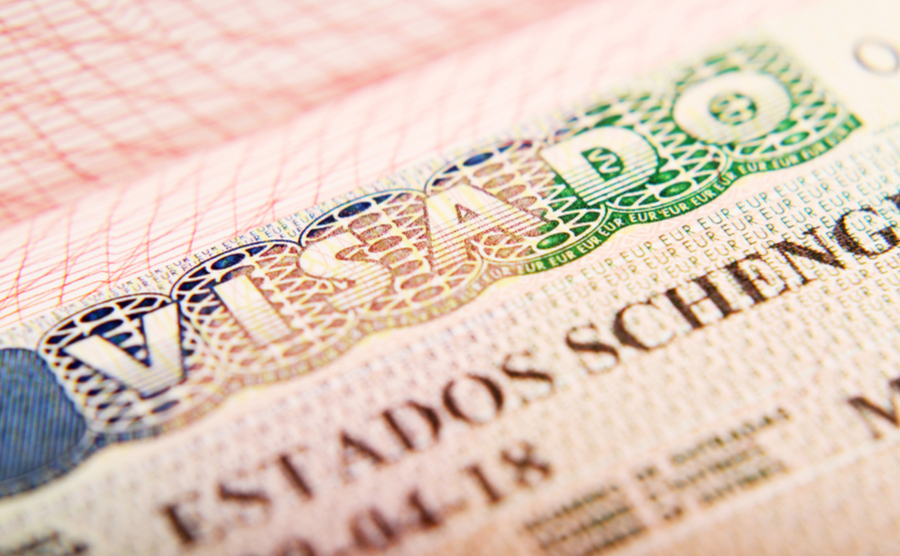
No need for a Schengen area visa IF you’re staying less than 90 days in 180.
Non-lucrative visa
The non-lucrative visa is similar to the European residency that we had before Brexit. It’s the visa to apply for if you wish to live, but not work, in Spain, such as for retirement. The initial visa lasts for one year but can then be renewed every two years until you reach the five-year threshold for permanent residency. You can also apply for a work visa after the first year.
To be eligible, you need to prove that you have a place to live (purchased or rented), the funds to support yourself, health insurance, and no serious criminal record.
For most applicants, the visa income requirements will likely take the most work to put together. Initially, you will need to prove you have an income of at least €27,000 per year, but if you live with another family member you will need to increase this by €6,000 per family member. So, for a couple, your total income would need to be €33,000 (approximately £27,000 as of 2022, but exchange rates do change).
Should you be planning to use savings to fund your lifestyle, this should also be sufficient, though what constitutes the right level of savings has yet to be officially defined by visa authorities.
You will need to provide evidence of your income or savings by submitting the original and stamped paperwork to show that you meet the requirements. These documents can include the holding of financial assets that guarantee income, such as pensions, rental property, or investments. Should any of these means come from investments in a Spanish company, you will have to prove you are not undertaking any work for them.
Golden visa (investor visa)
The golden visa — also known as the investor visa — is open to those who are looking to invest in Spain with a significant amount of money. The visa allows for the applicant to work in Spain, as well as allowing for dependents to apply for their own visa.
The main difference compared to non-lucrative visa is that you do not have to prove you have been living in Spain to renew it. And you can choose to pay taxes in either Spain or the UK.
If you’re thinking of applying for this visa, then you need to make a “significant investment” in Spain, which can include:
- A property worth at least €500,000 (bought without a mortgage)
- Invest in Spanish public debt for at least €2 million
- Buy shares in a company or make a deposit in a Spanish bank of at least €1 million
- Invest in a new business in Spain that will offer employment, contribute to innovation, or have a positive socio-economic impact in the local region
For most British people, it is the property element that proves most attractive. After all, not only is it (usually) a great investment, but you can live in it too. Check out thousands of suitable properties here.

Magnificent villa on the Golden Mile, Malaga
You also need to prove that you will have an income to support yourself and any dependents as you live in Spain — this is identical to the non-lucrative visa (i.e., €27,000 per year plus €6,000 per dependent).
The golden visa is the only one that allows you to initially live and work in Spain for two years rather than one. It comprises two parts: the visa and the residence permit. The visa must be renewed every 6–12 months, while the residence permit lasts two years before renewal is required. After two years, you can apply for a five-year extension, which will take you over the quota for permanent residency.
Work and residence visa
If you want to live and work in Spain, you will need a work and residence visa. If you will be an employee, you cannot apply for this yourself, so you must have a job offer before you move. Your employer can then apply on your behalf.
You can also qualify for this visa if you set up a company in Spain and become self-employed, though you will need to apply yourself.
Residency through marriage
If you (a British or other non-EU citizen) are married to someone with EU citizenship — for example, someone from Spain, France, Ireland, or Italy — you can get residency in Spain as their spouse. You will have access to the same rights that Britons used to in the EU pre-Brexit (subject to the residency of your EU spouse). Proof of funds is still required for this visa, but it is at a lower €6,700 for an individual. You also need to have your own health insurance and place of residence (bought or rented).
Student visa
For those wanting to study in Spain, it is possible to obtain a student visa, allowing you to live in the country for the duration of your studies. You must be accepted by an institution first, and then you can apply for the visa.
Discover Spain’s digital nomad visa here. It allows you to work remotely for an international company while living in Spain.
Claiming residency in Spain
Anyone spending more than three months in Spain must register as a resident in the country with the Central Register for Foreign Nationals (Registro Central de Extranjeros). Those who do not risk a €300 fine for overstaying.
Individuals can obtain permanent residency in Spain after having legally lived in the country for a period of five uninterrupted years. You must also prove you meet the minimum income for Spanish residency — at least €25,560 annually, plus €6,390 per each additional family member.
How to claim
To apply for the residencia permit you need a Spanish address, although it can be either rented or bought. You need to take with you:
- Proof of residence, such as a copy of your title deeds or rental agreement.
- Your NIE, which is not (as some assume) proof of residency. However, you do need it to claim residency.
- Your passport.
- A certificate from a bank to show you have sufficient funds to support yourself in Spain for one year.
- Medical insurance, and for the first year you may have to go private.
- The correct form.
Once registered, you are an official member of the community, and this confirms your presence in the country. For help with your residency application, speak to a lawyer recommended by Property Guides. Just fill in the form and we will introduce you.
It can take time to register with each authority, but there are a number of benefits to doing so. We would recommend speaking with a tax lawyer who can fully explain all the consequences of becoming a tax resident in Spain. This can be a complicated business, but we can put you in touch with the right company for you.
Residency for tax purposes
Becoming a permanent resident is not the same as residency for tax purposes. The latter depends on how long you spend in Spain each year. Spending more than 183 days per annum in Spain will make you a Spanish resident for tax purposes and you will have to pay Spanish Income Tax on any worldwide income.
There are several tax advantages of becoming a permanent resident in Spain, relating to Capital Gains Tax, Inheritance Tax, Wealth Tax and Non-Resident Property Owner’s Tax. We can put you in touch with a trusted independent financial advisor in Spain who has plenty of experience helping UK buyers moving to Spain.
How to get a tax number (NIE)
In Spain, your NIE (Número de Identidad de Extranjero) is your unique tax identification number which you will need for all financial and legal activities. You will likely receive your NIE when you get your residency.
Once you have your NIE, you will need to register on the padrón municipal, or municipal register. This is a list of citizens that the local council submits to the government to allow subsidised services in your local community, such as police, street lighting, and education, to be adjusted according to the amount of people living there.
Opening a bank account
It is not compulsory to open a Spanish bank account, but it can make life a lot easier if you do, especially as some British banks do not allow non-UK residents to have accounts. Many banks in Spain will support English speakers, but you should be aware of high bank charges and always use a currency specialist to transfer money. At Property Guides, we recommend Smart Currency Exchange.
To open a Spanish bank account, you will usually need:
- Proof of identity, such as a valid passport
- Proof of address
- Proof of your employment status, for example an employment contract signed by your employer, student cards, or unemployment documentation
- NIE and certificate
You will need to translate any documents into Spanish, which can be done using an official translator (traductor jurado). You may also need to get them authenticated by an Apostille stamp.
Healthcare in Spain: how the Spanish health system works
Healthcare in Spain is available for everyone. It’s non-contributory and paid for by tax money, much like the NHS, and each autonomous community has its own budget. Every resident of the country needs to register to access the service and, once complete, basic state healthcare is free.

You’ll need to organise healthcare soon after moving to Spain
There are still things that need to be paid for, like prescriptions, at full or reduced prices depending on the circumstances. How the costs are covered depends on what category of resident or non-resident you fall into:
- A resident in Spain in employment or self-employment will pay for their healthcare through social security contributions.
- A resident not in work in Spain can pay into the public health insurance scheme, also known as the Convenio Especial.
- A retired resident in Spain who receives a UK pension will receive UK-paid healthcare via an S1 form.
- A permanent resident (five years or more) will receive access on the same basis as a Spanish citizen, provided they are registered with their local INSS office.
- A temporary visitor to Spain using a European Health Insurance Card (EHIC) or a Global Health Insurance card (GHIC).
How do I register for healthcare in Spain?
To get access to healthcare in Spain as a British expat, you’ll need to register. How you register depends on which route you’re using to enter the system.
Working or self-employed resident
When you are employed in Spain or have set up as self-employed, you can get access to the Spanish healthcare system in the same way as a citizen. This system works much like the NHS in the UK, where your employer will deduct social security payments from your monthly salary.
First, you will need to get a social security number from the TGSS. To do this you must provide a copy of your passport or ID card, your Foreigner’s Identification Number (Número de Identificación de Extranjero, or NIE number), your residency certificate, and a completed application form. You will need to register your address at your local town hall (Padron) too.
To get access you will need to register at your local health centre with your social security number. Your dependants can also get the same access, though they need to be registered separately.
Resident who doesn’t work
If you are a resident (non-permanent resident status) and you don’t work, you can apply to join the public health insurance scheme in Spain, known as the Convenio Especial. Through this scheme, you pay a monthly fee, which grants access to healthcare. You can join if you have been registered as a resident for at least one year, and you’ll need to apply through your regional authority’s website.
With the Convenio Especial, you’ll need to pay the full cost for prescriptions. You’ll also have to pay for non-urgent transportation, orthopaedic supplies, prostheses, and dietary supplies.
If you have been living in Spain for less than a year, and you can’t get healthcare cover, you will need to purchase private medical insurance. If your medical care is paid for by the UK, you can’t join the Convenio Especial.
Retired resident with UK-paid healthcare
If you are retired, have registered as a resident of Spain, and receive a UK pension, you may qualify for UK-paid healthcare. You can access this funding by completing an S1 form from NHS Overseas Healthcare Services. When you get your S1 form, you have to register it with the INSS office or via INSS online, after which you and any dependents will receive healthcare on the same basis as a Spanish citizen.
Permanent resident
Once you’ve been a resident of Spain for five years, you can apply to become a permanent resident, which will give you access to the same healthcare as a Spanish citizen. Once you have become a permanent resident, you will need to request a legislation letter (documento de no exportación) from NHS Overseas Healthcare Services. This can then be shown to the INSS, who will provide another document to be given to your local health centre.
Temporary visitor
Temporary visitors — for example, if you are viewing properties there before you move, or if you have any guests coming to visit from the UK — can use a Global Health Insurance Card (GHIC) to access a basic level of state healthcare in Spain on the same level as citizens.
The GHIC replaces the old European Health Insurance Card (EHIC), which provided healthcare for UK citizens in Europe pre-Brexit. You can apply for a GHIC through the NHS, and it works in exactly the same way as an EHIC did.
It will cover things like emergency treatment and A&E trips, treatment for chronic or pre-existing medical conditions, routine medical or maternity care, and oxygen and kidney dialysis. You will still have to pay for some services, including contributing to prescriptions, and the card does not give you access to private clinics in Spain.
It is not advisable to rely solely on the GHIC card, as there have been cases where the card has been refused in some parts of Spain. Therefore, travel insurance is still advised.
Using a local doctor in Spain
As part of the healthcare system in Spain, every town has a national health centre called the CAP. Here you will find GPs, paediatricians and gynaecologists. This is frontline medical care.
Before you can register at your local health centre, you will need to obtain a Padron, i.e., register your address. You need to do this at your local town hall. The documents required to get this are your NIE number, passport, residency card, a rental agreement or deeds to your property, and a recent utility bill. Registering is usually free but there may be a small administrative charge.
When you register with your local doctor you will need to take your Padron, which must be less than three months old, as well as your Social Security card, passport, and NIE number. You can then apply for your health card (tarjeta sanitaria individual – TSI). You will need to show the health card every time you visit the doctors or hospital or collect a prescription from the chemist.
Dental treatment is not covered by the Spanish state healthcare system, and you are not required to register with a dentist in Spain.
Private healthcare in Spain
There are various levels of private healthcare in Spain, from treatment in the home to access to a wide variety of clinics in Spain. When choosing private healthcare, it is important to consider what you will be covered for, particularly if you have pre-existing conditions.
You can source your own private medical insurance, or you can use a broker to source the medical insurance that is best suited to your needs. Always make sure that, if you use the services of a broker, they are independent. Independent brokers will have access to a wide variety of insurers and will not be tied to one provider.
Here at Property Guides, we work alongside insurers to find great cover for those looking to make the dream move. We can recommend a leading provider of private health insurance in Spain who can look after your interests abroad.
Dentists are always private in Spain and are usually of a very high quality. However, they will usually require a payment that is not covered by your health insurance.
Prescriptions and pharmacies
Medication can only be purchased at a pharmacy (farmacías), but these will usually be found on every high street. Certain registered chemists can offer medical consultations and advice on treatments.
You can buy many medicines at a chemist without a prescription — far more than in the UK. There are no national chains as the pharmacist owns their pharmacy with limits to the number allowed in each town. There is always a chemist on duty 24 hours a day somewhere locally, with each pharmacy placed on a rota to provide this service.
The amount you pay for your prescriptions depends on your income. Spain has a co-payment system that sees residents pay between 10% and 60% of the cost of prescriptions — what percentage you pay depends on your earnings. These can differ from region to region, so be sure to check locally.
Emergency services
For emergencies dial 112, and for ambulances dial 060. It is quite possible that the person who answers can speak some English, especially in touristy areas, but don’t assume that they will.
How to move your possessions to Spain
When moving abroad, you will need to decide which of your possessions to take with you.
Prior to the UK leaving Europe, it was pretty easy to move your possessions to Spain or any other European country. Post-Brexit, things have changed slightly. Of course, you can still move your worldly goods to your new home in Spain, but there may be more paperwork to do and customs forms to complete.
In order to avoid paying taxes on bringing your things to Spain, you should apply for residency first.
Choosing your removal company
It is strongly advisable to use a reputable removal company that is a member of The British Association of Removers Overseas (BAR) or The Association of International Movers (IAM).
The removal company can deal with all the customs declarations on your behalf. If you have successfully applied for residency, you will need to show proof to enable you to be exempt from paying import duty and VAT. It would also be a good idea to present a TIE card (proof of residency) and a bank statement with your address.
You do not need to present proof of residency or a list of items being shipped immediately, but you must do so within 12 months of residency acceptance. Or you could apply months before you move – the proviso being that you can prove you are actually moving to Spain. Obtaining an empadronamiento from your local town hall is usually proof enough.

Loading up the car and moving to Spain, the adventure begins! (Kevin Shipp / Shutterstock.com)
Asking the right questions
When you have found a good removal company, do ask them to explain their insurance policy for moving possessions to Spain. Will the insurance cover the items once they have been delivered to you? What about storage if required before or after the move? If they are shipping to Spain by sea, do they have marine insurance?
Ideally, you want to contact them three to six months before you move. They will arrange to visit your home to see the quantity and type of possessions to be transported and to arrange a removal date. The better companies will always be busy!
Check that the company does all packing of goods: it is better to pay a few extra pounds and get your things professionally packed. It is also worth noting that some removal companies will not guarantee goods unless they have been packed by them.
Check that quotations include all fuel costs, motorway tolls and ferry cages. We would recommend getting several quotes to enable you to compare prices.
What is exempt from customs and VAT?
Everything you would normally call “household items”, for example bikes, cars, and pets, are all exempt from customs and VAT tax. There is a caveat, though: you must have lived outside the EU for at least a year before moving to Spain, and everything you are bringing into the country must have been used for at least six months prior to the move, including cars. Of course, the items you are transporting must be used in the same way they were used in the UK.
Packing
Remember to keep essential items to hand from the beginning. Allowing for at least six weeks in transit, you will need to pack carefully — once your belongings are loaded, you can’t access them!
Sort out keys for your present accommodation, car, office, and so on, and make sure they are kept separate, labelled, and ready to hand over to the right people before you leave. All boxes should be clearly labelled, with lists stating exactly what is in each box. Any reputable company will ask for this list in advance.
It is important to comply with regulations when your possessions enter a new country. Your chosen removals company will be able to give you a specific list of what can and cannot enter Spain.
You will also need to:
- Drain all petrol and oil out of lawnmowers and similar equipment before transportation so that they comply with fire regulations
- Remove all batteries, for example from torches and radios, as they can leak in transit and damage your equipment
- Clean and paint any garden tools and furniture – items with soil on them may be denied entry at customs
You should also think about your electrical equipment, and whether it will work in your new home. Your removals company will be able to advise you of this. Those that can’t be used can be sold or given to the local charity shop.
If you are not moving directly into your new home, you will also need to discuss storage. It may be cheaper to store your goods in Spain rather than in your home country — it is worth researching this.
Question what to take and what to leave behind
Unless you are moving to a mountainous region or the north of Spain, the climate and lifestyle will be very different from Britain. Your furniture, curtains etc may not suit modern townhouses or apartments close to the sea, but then again, they might.
Outdoor furniture
You can find good furniture and attractive decorative items in Spain. You will probably be spending more time outside, so it is worth investing in good quality terrace and garden furniture.
Rugs
Most Spanish homes have tiled or wooden floors rather than carpets. However, you might want to bring your good rugs with you as it can get chilly during the winter months. Alternatively, you will find a comprehensive range of rugs in Spain to suit all budgets.
Curtains
Curtains tend to be lightweight, mostly to stop the sun pouring in on hot days, and almost all Spanish properties have shutters. Interlined, heavy curtains many not be suitable in Spain unless your home is high up in the mountains. There are many local shops which offer attractive curtains, readymade or made to measure.
Plants
Under post-Brexit rules, you can’t bring plants into Spain from the UK. In any case, plants that survived happily in a British garden may not feel quite as at home in Spanish soil. You’d be better off going to a local garden centre after you arrive to check out what grows best in your area.
White goods
When it comes to white goods, most will work in Spain, but you may have to change the plugs or buy numerous adaptors depending on which country you are moving from, as the sockets can be different to what you are used to. The price of washing machines and the like is higher than in some other countries – the UK, for example – so if your existing machine is reasonably new, a well-known make and in excellent condition, it may be worth bringing it with you.
You may also need spare parts, so bring only internationally recognised makes. Spain now only has digital TV, so you will need a decoder. If your TV is over three years old, it is better to buy one in Spain when you arrive. Search around, as prices can vary widely.
If you currently live outside the EU, smaller electrical appliances, such as hairdryers, kettles, or kitchen equipment will work in Spain with an adaptor. You will need to buy several adaptors!
Beds and mattresses
Spanish bed sizes and pillow shape can differ from those in other countries, such as the UK. It may be practical to buy extra bedlinen at home before you leave if you are planning on bringing your own bed with you.
Beds and mattresses are sold separately in Spain and can be expensive. Nonetheless, if you search around, some companies offer good packages.
Pets
These are, of course, coming with you! But first, make sure you and they comply with all the requirements to allow pets into Spain, for example:
- They must have a microchip
- They must have been vaccinated against rabies
- A dog must have treatment against the tapeworm Echinococcus multilocularis, where your destination country is free from it (Northern Ireland, Norway, Finland, Ireland and Malta)
- They must have an EU animal health certificate if travelling from a non-EU country
The best advice is to check and double-check the requirements on the British and Spanish government websites. A lot of the information on the Spanish site is in English. Ask your removal company for advice too as they are frequently travelling between the two countries, bringing possessions in both directions. If you have done your homework, it should be plain sailing!
How to move your pets to Spain
For many, the idea of moving to Spain without their pet is unbearable. Luckily moving cats or dogs is quite straightforward, although there are several things you need to do in advance. For more exotic pets, things get a little more complicated.
Travelling around Europe with your pet, especially dogs and cats, is fairly easy. It just requires a little forward thinking to organise the necessary vaccinations and paperwork. If you plan to travel by plane, it is best to check with the airline company about their rules and requirements. Some won’t allow animals in the hold during summer, and some don’t carry pets at all.
Rules for more exotic pets are very strict, and they will generally depend on the Autonomous Community you are moving to. Andalusia, for example has banned all exotic creatures as pets, and owners of dogs, cats and ferrets must declare their animals to the town hall within three months of arrival and to register them on the Animal Identification Registry of Andalusia (Registro Andaluz de Identificación Animal – RAIA).

No need to leave the pets behind when moving to Spain
Certain dangerous dog breeds must be registered within one month, and they will require a special dog owner’s licence — this has a wealth of information attached that must be carried whenever the dog is out in public. The animal must be kept on a lead at all times when outside your home, and only one dog may be handled per person. It is advisable to check the precise rules in your area.
Preparing your pet for travel
When you transport a pet to Spain, it will need to have an identity microchip, and a blue Pet Passport, as required by the EU commission for all pets within the European Union.
Those coming from the UK will need to be part of The Pets Travel Scheme (PETS), which allows for you to travel freely to and from the UK with your pet without it having to undergo a period of quarantine. To find out more about this, visit the website of the Department for Environment, Food and Rural affairs (DEFRA). It’s important to remember that you may only bring up to five animals as pets into Spain, and none of these can be under three months old.
You will need your vet to provide you with a certificate for each pet you are transporting, confirming:
- Identification by microchip
- Valid rabies vaccine (inactive)
- New vaccination pass (blue pet pass)
- Blood test to confirm the vaccine is in the system
This certificate is valid for four months, and no animal without a certificate will be allowed into Spain. Pet insurance is advisable, and there are many companies offering competitive policies in all areas of the country.
There are numerous regulations in Spain specifically regarding pet dogs: they must always be held on a lead in public areas, and when in a vehicle they must be kept away from the driver. They are allowed on trains, but they may need to be placed in a pet carrier or muzzled.
Vets in Spain
Vets in Spain generally offer a very high standard of service. All dogs will need an annual rabies booster injection, and though not compulsory, other vaccinations are recommended, including annual booster injections against Hepatitis, Paraininfluenza, Distemper and Parvovirus. If you will be using a kennel you will be required to vaccinate your dog against kennel cough (Bordetella Bronchiseptica). Cats should be vaccinated against feline gastroenteritis and typhus.
Animal shelters in Spain
Encuentra tu Mascota has an English language website providing information on animal shelters to facilitate the adoption of animals in Spain. It also has practical information on animal health, and access to the pet lost and found database. Animal rights are becoming a public issue here, and recently people have been taken to court and fined for mistreating their pets.
Getting utilities connected in Spain
Setting up your electricity, gas, water, Internet, TV and phone are necessary parts of your new life. Getting them set up should be relatively easy, and if you are moving into a property that has already been lived in, you would expect to have everything connected and installed already, although you may wish to do some research on the companies that you use.
If you buy a property off plan, you must make sure from the outset that all utilities will be properly and legally connected. It will be up to you to actually get the accounts put in your name once you take over the apartment or villa.
If you choose to use gas and electricity from the same supplier, you can often get a special deal — although it isn’t always the most cost-effective way of doing things. It is, however, very easy to change suppliers: just make sure that you aren’t tied into a fixed time deal! We would recommend becoming part of the OCU (Organisation of Consumers and Users, similar to the Consumer’s Association in the UK), who run campaigns to help members buy electricity and fuel more cheaply.
Electricity
For many years electricity was heavily subsidised by the government which resulted in a huge black hole in the budget. Now prices are fairly high to make up for this. In fact, the cost of electricity in Spain is one of the most expensive in Europe.
There are now numerous companies offering green electricity and there are two types of contract. One is a fixed rate contract, the other a variable rate (market price) contract. It very much depends on your circumstances as to which one is better for you, and it also pays to shop around by using OCU or a comparison site such as Rastreator.
Gas
While electricity prices are fairly high, gas prices are quite low as the industry is regulated differently. Most of the gas consumed in Spain is bottled gas. Gas tanks for heating will be dependent on a particular supplier, and you will have to tie yourself into a contract for regular deliveries.
Water
Water is a precious commodity. Parts of Spain have had drought conditions for years, while the northwest receives more than its fair share of rainy days. Water in Spain is therefore a contentious subject sometimes, especially when you see beautiful golf courses with wonderful greens, while local farmers are desperately trying to save their crops.
Despite this, mains water is really not all that expensive unless you are irresponsible and use it for your garden with abandon. Filling a swimming pool may be pricey, with a typical 8m x 4m pool holding over 7,000 gallons of water. New properties will often have shower rooms only, or just one bath as a way to reduce water consumption.
As a guide, water supply for a three-bedroom apartment should cost around €35 per month; for a villa with a garden and a pool this will be substantially more.
Saving water is good for the environment as well as your budget and you can buy gadgets to help you do this. Special taps with filters can reduce water usage by 30%, showers with flow regulators will also restrict water use and Ikea has a tap with a cold start function, avoiding the unnecessary use of hot water for daily rituals like washing your hands or brushing your teeth.
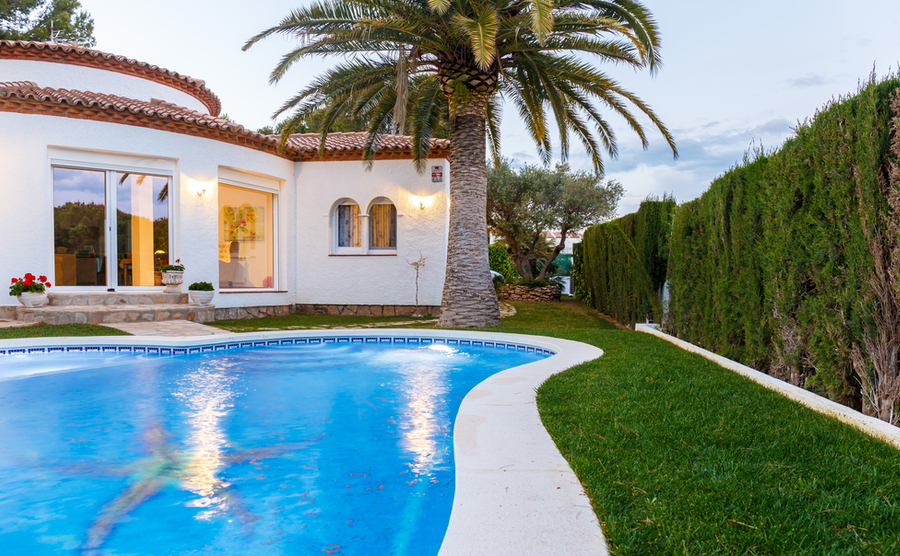
You can’t beat a swimming pool in Spain, but they do come with costs
Internet
If you need broadband you will need to take out a contract with one of the many internet providers.
The main players in Spain are Movistar (Telefónica) who actually owns all the telephone lines, Orange (actually Orange, France), Vodafone (UK owned) and Jazztel (Spanish). All of these companies offer much the same sort of service as each other, but prices can vary. It is a good idea to check precisely what you are being offered, as cheapest isn’t necessarily best – and remember that Movistar owns the lines, so in the case of disconnection due to inclement weather, they will get their own customers back online first. Internet contracts will usually cost from €16 + IVA (VAT) per month.
Using the internet for video calling through Skype or similar is also popular. The quality of the calls you make will vary, depending on your connection speed and the traffic being carried at any one time.
Fibre optic internet is available now in most of Spain’s larger cities and towns, though you might find that only certain districts are covered and that they are provided by only one of the internet providers mentioned.
All the companies also have packages which include mobile phones, fixed phones, internet, and TV. Movistar offers a deal with Netflix, Vodafone with HBO and Orange has a good offer on sport and now also offers Netflix.
Telephone
Getting a fixed telephone line can be complicated, especially if you are moving to a new property where there has not previously been a telephone connection. In this case, it’s a good idea to apply for a line and/or number as soon as possible after purchasing your property because this can take from two weeks to two months. The cost per month of a phone line varies from €14 to €16 + IVA depending on which company you use.
Telecommunication companies currently offer the best deals if you take out both a fixed contract and a mobile phone contract with them. Nowadays most contracts are not for a fixed period, meaning you can change supplier more easily without a penalty. However, be aware that a contract with any supplier allows them to increase charges whenever they want. Prices have risen quite a lot during the last year across the board.
When you are considering which company to use, make sure there is an English-speaking service and you can also ask for your bill to be in English, though not all can provide this. You should also expect to not speak English in the shops of these companies except in larger towns and cities or in popular holiday destinations.
Most telephone suppliers offer free calls within your province using a fixed phone and some have deals whereby you can call a nominated number for free.
Also consider buying an unlocked mobile phone from websites such as Amazon.es. This way you only pay for using the phone and not an additional amount for the phone itself. Often the price on sites like Amazon sell the phone for less than the telephone providers. With an unlocked mobile, it is easy to change to another supplier as you are not locked into a contract to buy the mobile.
TV
More and more people are using their TV to access online films, TV programmes and even the Internet. If you wish to watch British TV, you will need a satellite installed and a decoder. There are very good satellite installation companies in Spain, some British owned, and they will usually be able to help you with setting up your system to receive British TV. Try to get recommendations locally for a supplier.
All the main Spanish TV companies now offer films and series in the original language, so you can access many British and American shows and films in English and often also with English subtitles.
There also TV “Clubs” which you can join to watch live UK TV through the internet on Smart TVs. They cost around €5 a month for HD TV. You should have a British TV licence to be legal.
It’s a good idea to have Spanish TV too as this will help you learn the language, and keep you informed of what is happening in your new country. People learn languages quickly by watching the news and other programmes in a foreign country, and keeping up with what is happening in your area helps you to feel part of the community.
Driving in Spain
The British Government has confirmed that UK drivers do not need an international driving permit in Spain, and indeed in any of the EU member states. If your number plate has GB or GB with a Union Flag on it, you do not need to display a GB sticker.
When driving in Spain, you will need to bring your Great Britain or Northern Ireland driving licence, the logbook (V5C) and insurance certificate if you are driving your own vehicle from the UK, and a VE103 certificate if you are driving a hired/leased vehicle from the UK.
In terms of insurance, it is advised to have a green card — which gives you at least third party cover — when driving in the EU.
If you’re thinking of moving to Spain from the UK, there’s a lot to organise at first — but it will all be worth it once you start your new life abroad! At Spain Property Guides, we can provide you with advice and guidance on everything from buying property to living in Spain, which can help make moving to Spain a breeze. So, take a look and start your journey today.
We also offer lots of free downloadable guides, including our Spain Buying Guide:
Taking care of your health doesn’t stop when moving to Spain. Get this one stop shop for expatriate healthcare.
To help you plot your way through a possible post-Brexit scenario, to ensure you can fulfil that dream of a Spanish lifestyle.
A handy guide to everything you need to know about negotiating for a property in Spain.
The Property Buyer’s Guide to Currency
Buying in Spain from the UK means you agree to a fixed price in euros but that is constantly moving in pounds. How can you budget when it is constantly changing?
Speak to an expert
We have Spanish property experts at offices in the UK and Spain who are waiting to answer any questions you have about buying property in Spain. Get in touch on +44 (0)20 7898 0549 from Monday–Friday, 8:30am–6:00pm or email [email protected].
Our friendly team can also put you in touch with all the professionals you will need by your side when buying property in Spain, to give you all the guidance you need and steer you around common pitfalls — particularly during those all-important viewing trips:
- Trusted estate agent
- Expert currency specialist
- Independent solicitor
- Independent financial adviser
- Property surveyor
To speak to the right professional service providers for you, contact the Spain Property Guides Resource Centre today or fill in the enquiry form below.
Download your free Spain Buying Guide
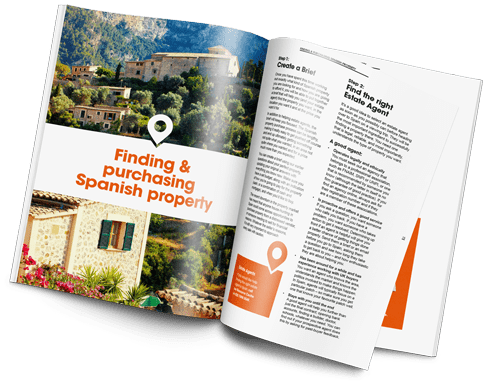
As well as a free online guide to buying property in Spain, we offer a downloadable booklet that will take you through the entire process. This PDF can be saved to your device or printed for future reference. Simply enter your details to download your free Spain property guide, which will help you to:


